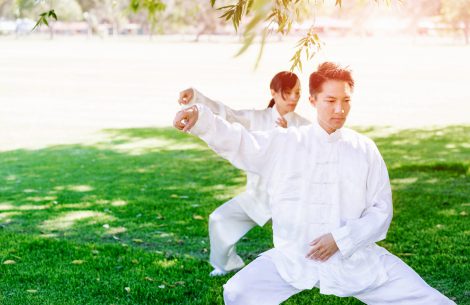Tai Chi may be one of the most studied forms of exercise ever. A large reason for all the research (which continues!) may be a result of its success in promoting health across a wide variety of conditions. If you haven’t done Tai Chi before, here are 7 reasons you might want to give it a try.
Builds Leg and Core Strength. This may not be a benefit you’ve heard of before, but it might be one of the most valuable, especially for adults. Tai Chi movements promote leg strength through slow movements which demand muscle control. The whole-body movements encourage core strength which helps to improve balance and flexibility.
But why is this so valuable? For starters, millions of Americans end up hospitalized due to falls every year. The National Council on Aging says falls represent the “leading cause of fatal and non-fatal injuries for older Americans.”
Of course, this begs the question, does Tai Chi help prevent falls? A review of 10 studies found that the rate of falls for at-risk adults drops by up to 50% for those who practice Tai Chi.
It Lifts the Mood and Eases Depression. A 2011 UCLA study reported 65% of older adults who took Tai Chi classes experienced improvements in their mood and outlook. A review of 11 Tai Chi studies also found it improved memory, recall, and overall cognitive function in older adults too, a big factor in mood and feelings of depression.
Tai Chi requires focus to remember the order of the exercises, thus stimulating the brain. Tai Chi combines bodily awareness which adds to the challenge and the mental exercise. Plus, Tai Chi is typically a social activity which encourages engagement making it more enjoyable while supporting social relationships which have been shown to help alleviate depression.
Improves Lung Function in COPD Patients. A recent review of 16 studies noted that Tai Chi improves lung function in patients with COPD. Those who did the Tai Chi said their quality of life was better. They also reported less fatigue too.[4]
Now, you don’t need to suffer from COPD to enjoy the improved lung function offered by Tai Chi. The practice of deep breathing and the way many exercises expand the rib cage help to support lung function in anyone who practices.
Better Sleep. Tai Chi improves sleep and research indicates it works to relieve insomnia. The effects however went far beyond a good night’s rest. Those who did the Tai Chi and slept better also had less inflammation.
Fewer Joint Aches and Pains. The movements of Tai Chi keep the joints moving, which improves blood flow and helps prevent stiffness and achiness. Relaxation, another benefit of Tai Chi, has also been found to help reduce feelings of pain and soreness. One study has reported Tai Chi may also help patients with chronic pain like fibromyalgia.
Lowers and Maintains Healthy Blood Sugar. Exercise in general helps to lower and support healthy blood sugar, and Tai Chi is no different. Studies have shown people who practice Tai Chi have lower blood sugar, but a recent study reported that not only did Tai Chi help lower blood sugar in people who had never done it before, it also provided antioxidant benefits as well!
Tai Chi Boosts Energy. The exercise provided by Tai Chi helps to get the metabolism going. Increased oxygen prompted by the exercise and deep breathing supplies the blood with oxygen needed for energy. Relaxation may calm and soothe the mind, body, and soul, but when rested, it’s natural to feel more energized. In this way, Tai Chi delivers greater stamina and endurance too.
References:
- https://www.cdc.gov/nchs/data/hus/hus16.pdf#075
- https://www.ncoa.org/news/resources-for-reporters/get-the-facts/falls-prevention-facts/
- Lomas-Vega R1, et al. Tai Chi for Risk of Falls. A Meta-analysis. J Am Geriatr Soc. 2017 Sep;65(9):2037-2043. doi: 10.1111/jgs.15008. Epub 2017 Jul 24.
- http://newsroom.ucla.edu/releases/tai-chi-beats-back-depression-199019
- Wayne PM, Walsh JN, Taylor-Piliae RE, et al. The Impact of Tai Chi on Cognitive Performance in Older Adults: A Systematic Review and Meta-Analysis.Journal of the American Geriatrics Society. 2014;62(1):25-39. doi:10.1111/jgs.12611.
- Wu L-L, Lin Z-K, Weng H-D, Qi Q-F, Lu J, Liu K-X. Effectiveness of meditative movement on COPD: a systematic review and meta-analysis. International Journal of Chronic Obstructive Pulmonary Disease. 2018;13:1239-1250. doi:10.2147/COPD.S159042.
- Irwin MR, et al. Cognitive behavioral therapy and tai chi reverse cellular and genomic markers of inflammation in late-life insomnia: a randomized controlled trial. Biol Psychiatry. 2015 Nov 15;78(10):721-9. doi: 10.1016/j.biopsych.2015.01.010. Epub 2015 Feb 4.
- Zhang F, et al. A randomized trial of tai chi for fibromyalgia. N Engl J Med. 2010 Dec 2;363(23):2265-6; author reply 2266-7. doi: 10.1056/NEJMc1010478.
- Mendoza-Núñez VM1, et al. Hypoglycemic and antioxidant effect of Tai chi exercise training in older adults with metabolic syndrome. Clin Interv Aging. 2018 Apr 3;13:523-531. doi: 10.2147/CIA.S157584. eCollection 2018.

